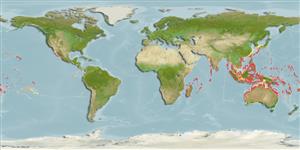>
Blenniiformes (Blennies) >
Tripterygiidae (Triplefin blennies) > Tripterygiinae
Etymology: Helcogramma: Greek, helkos, -eos, -ous = ulcer, sore + Greek, gramma = letter, mark (Ref. 45335).
More on author: Rosenblatt.
Environment: milieu / climate zone / depth range / distribution range
นิเวศวิทยา
เกี่ยวกับทะเล,น้ำเค็ม เกี่ยวกับหินโสโครก; ระดับความลึก 0 - 32 m (Ref. 13227), usually ? - 10 m (Ref. 6211). Tropical
Indo-West Pacific: Sri Lanka, including Cocos-Keeling Islands and Christmas Island, to Thailand then Japan, the Phoenix and Marshall Islands and American Samoa, also Fiji.
ขนาด / น้ำหนัก / Age
Maturity: Lm ? range ? - ? cm
Max length : 3.1 cm SL เพศผู้/กระเทย; (Ref. 13227)
Short description
เครื่องมือที่ใช้ในการแยกชนิดสัตว์,สิ่งมีชีวิตออกจากกัน | สัณฐานวิทยา | ความยาวต่างๆ
เงี่ยงครีบหลัง (รวม) : 19; ก้านครีบอ่อนที่หาง (รวม) : 9 - 12; เงี่ยงครีบก้น: 1; ก้านครีบอ่อนที่ก้น: 18 - 20.
Adults inhabit surge zones of exposed reefs (Ref. 1602), on rock surfaces and under ledges (Ref. 13227). Eggs are hemispherical and covered with numerous sticky threads that anchor them in the algae on the nesting sites (Ref. 240). Larvae are planktonic which occur primarily in shallow, nearshore waters (Ref. 94114).
Life cycle and mating behavior
Maturities | การสืบพันธุ์ | Spawnings | Egg(s) | Fecundities | ตัวอ่อน
Fricke, R., 1994. Tripterygiid fishes of Australia, New Zealand and the southwest Pacific Ocean (Teleostei). Theses Zool. 24:1-585. (Ref. 13227)
IUCN Red List Status (Ref. 130435)
Threat to humans
Harmless
Human uses
การประมง: ไม่มีผลประโยชน์
เครื่องมือ
Special reports
Download XML
แหล่งที่มาจากอินเตอร์เน็ต
Estimates based on models
Preferred temperature (Ref.
123201): 25.1 - 29.3, mean 28.5 °C (based on 2882 cells).
Phylogenetic diversity index (Ref.
82804): PD
50 = 0.5000 [Uniqueness, from 0.5 = low to 2.0 = high].
Bayesian length-weight: a=0.00562 (0.00258 - 0.01228), b=3.08 (2.89 - 3.27), in cm total length, based on LWR estimates for this (Sub)family-body shape (Ref.
93245).
ระดับชั้นอาหาร (Ref.
69278): 3.0 ±0.3 se; based on size and trophs of closest relatives
ความสามารถในการกลับคืนสู่ปกติ (Ref.
120179): ความสูง, เวลาต่ำสุดที่จะทำให้ประชากรเพิ่มขึ้นเป็น 2 เท่าใช้เวลาน้อยกว่า 15 เดือน (Preliminary K or Fecundity.).
Fishing Vulnerability (Ref.
59153): Low vulnerability (10 of 100).
Nutrients (Ref.
124155): Calcium = 571 [200, 2,589] mg/100g; Iron = 3.15 [1.09, 7.71] mg/100g; Protein = 17.9 [16.1, 19.8] %; Omega3 = 0.106 [0.022, 0.525] g/100g; Selenium = 78.2 [13.0, 380.6] μg/100g; VitaminA = 53.6 [7.0, 417.9] μg/100g; Zinc = 5.77 [2.43, 11.32] mg/100g (wet weight);
